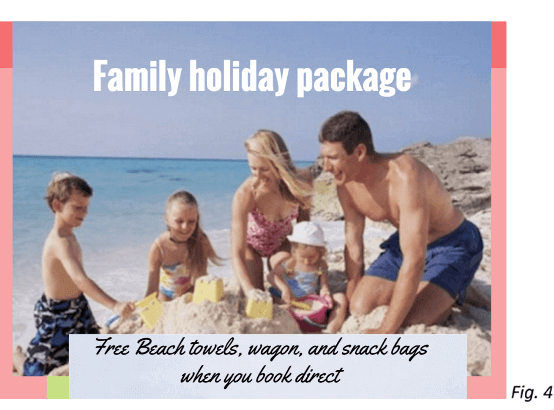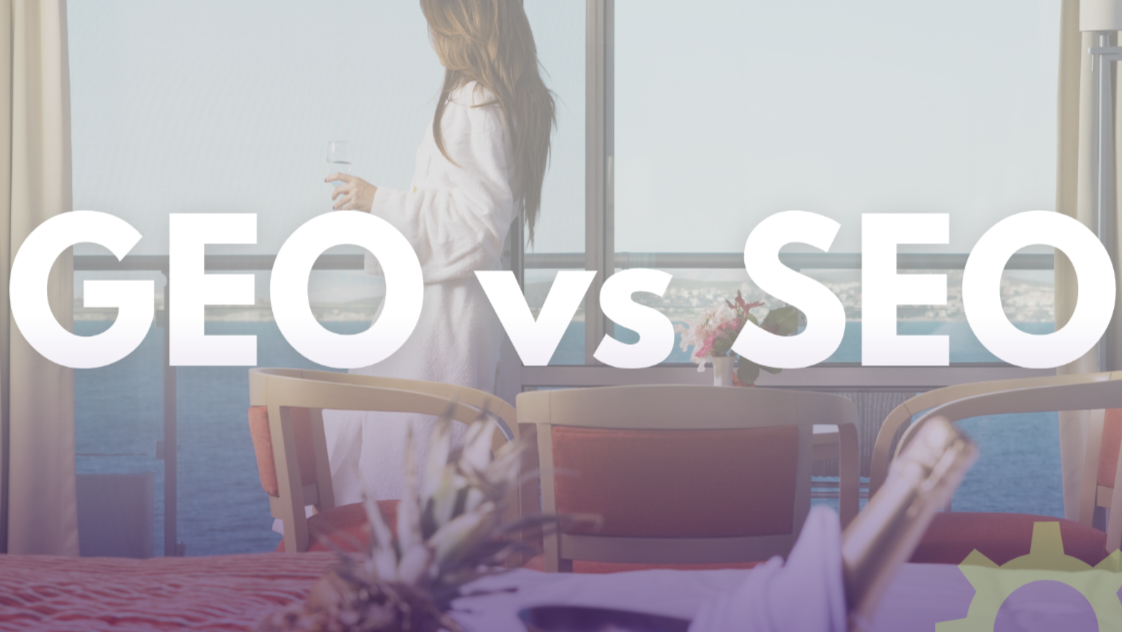
Every hotel has some form of PPC campaign running these days. And regardless of whether you’re using retargeting ads, Facebook ads or remarketing lists for search ads (RLSAs), the intention is always the same – let’s make sure we catch our prospective guests’ attention.
NB: This is an article by Jeremiah Magone of Hospitality Copywriting
But in that pursuit, many hotels overlook one important step.
They focus on the strategy for delivering their message more than the message itself. And that makes their advertising more expensive.
After all, if you aren’t promoting something special about your hotel… something people can’t find anywhere else… then the chances of visitors bouncing away from your website increase dramatically.
That means you might have to pay for that same visitor again and again. And that really hurts your bottom line.
Read on to find 3 ways you can quickly improve the quality of your ads… so you can win more business at higher margins.
First, let’s do a quick critique of the average PPC ad, and see why it’s costing so much:

When you look at these 3 examples, with logos removed, it’s pretty hard for anyone to tell them apart, right? They might even be the same property. Who knows?
Unfortunately, without a clearly defined Unique Selling Proposition (USP), these ads are forced to compete on price.
“Best Available Rates,” shouts the first.
“20% off when you book direct,” chimes in the second.
“10% off + free Wi-Fi for advance bookings,” counters the third…
Yes, these are all good offers. But the problem with this approach is that, even if guests are looking to book right now, they still have to click on each one of these ads and spend time comparison shopping before they know they’re getting the best deal. And since all that takes time, energy and attention span, many people will still turn to the OTAs to make that process easier… which ends up wasting your ad spend.
Let’s look at this situation another way…
What if there was a grocery store that didn’t conveniently group their foods together…?
If so, even when they offered a great price on one brand of peanut butter, for example, you’d still have to do a few laps around the store, making comparisons, before you knew you were making the right choice.
What a painful shopping experience, right?
That would be a real hassle, but that’s what price-focused PPC ads are forcing consumers to do.
Now I’m not saying these ads don’t work.
If you show your ad to enough people, someone is going to take you up on your offer.
But if you want higher conversion rates… so you can make your ad budget go farther… and scale out your campaigns… then you need to focus on stopping people in their tracks. By that I mean, you need to give husbands a solid rationale for visiting your area. You need to give wives a real reason to call up their hubby and say, “Hey, babe! Why don’t we check this out, this weekend?”
Here’s one way to do that, with a small cavate.
The ad below paints the picture of “a World of French Provincial Enchantment”, which I think this good, because it tells a story. But it makes a common USP mistake which we should all try to avoid.

That is, they’ve tried to eliminate their competition by boasting and bragging that they’re the ‘best’, ‘premier’ or ‘most’ (adjective) hotel around… without any facts to back that up.
Now, ‘the most romantic’ hotel is a pretty subjective claim, right?
And if I don’t believe that claim – that will absolutely kill engagement.
Even worse, if I’m curious and I click into their website to look for more proof on this claim, and I’m not able to find it in the first 3 seconds, that’s a letdown. And so I’ll probably click away…
The point is: a weak USP claim can actually work against you, if you’re not careful.
If they could have just said, “The most romantic boutique hotel… according to the San Francisco Chronical in a survey of the top boutique hotels in SF…,” then I’m sure this ad would pull better.
It’s ok to be wordy if it helps build trust. Because trust is even more valuable than money in the On-line world these days.
So, what is a winning USP? And how can you find one for your property?
A winning USP is something that separates you from the crowd. And, at a time when so many hotels offer a similar level of product and service, one of the best ways to do that is to make your advertising all about the reader.
i.e. show them the experiences they’re going to enjoy when they stay with you. Help them ‘count their chickens before they hatch.’
Here’s a good example of this point:

This ad says nothing about the hotel, but it does a great job of using future pacing to:
- Give the reader a reason to visit
- Speak to the earliest stages of the shopping journey. i.e. choosing one location over another
- Create excitement. Compared to pictures of a hotel’s edifice, entrance or bedrooms, this is a big advantage
- Imply a sense of urgency by using a call to action that’s all about the ski season, not just about booking a room
At the end of the day, this ad doesn’t just say, “Experience our hotel,” it shows exactly what that experience is like, and that gives it some real power.
How can you select and highlight the best experiences at your hotel?
Crafting powerful marketing messages requires a ‘concierge mindset.’
Here’s how you can take that perspective:
On page 58 of our new book, Hospitality Marketing Synergy, I ask readers to get into this mindset by, first of all, making a list of all the local businesses they usually recommend their guests to visit.
Step 2 is to think about how you can make sure your guests have a great time when they stay with you.
Then, with these local businesses in mind, start brainstorming ways to partner up and offer these businesses’ products and services in your advertising.
Here are a few examples of what I mean by that.
You could partner with local businesses and create PPC campaigns for:
- Room + kayak
- Room + luxury spa down the street
- Room + beer and wine tasting
- Room + limo service from the airport
- Room + car rental
This doesn’t have to be complex!
One B&B I know, for example, created an arrangement with a local ice cream store where, whenever guests showed them their room key, with his logo, they would get a free cone.
This made it possible for the B&B to add a bit of interest in their advertising. And the ice cream store was happy to welcome the extra business.
Taking the next step…
Now, let’s take that same idea one step further. With better tracking (also known as affiliate tracking), that same B&B could place an ad on the ice cream shop’s website in exchange for a small commission.
In this way, local businesses could become “channels” for that hotel’s distribution strategy, helping them lower their monthly commission costs, and keeping more money in the local economy.
Win-Win-Win!
Here’s another example of what that approach might look like if they decided to partner with one of the local surf shops:

Do you see how this tells a story?
… How it gives people a clear reason to visit the area, while eliminating competition from consideration…
… and how, ultimately, that makes their travel planning more convenient? …So it’s a ‘win’ from the guests point of view, as well…
By now I hope you see why focusing on your guests’ experience can give you a nice sales advantage.
And I’d also like to note that, by adopting this approach, there are a few ways you can help your ad budget work a lot harder, so you can create bigger and better results.
For example:
- Long tail PPC ads are less expensive
- The appeal of ‘experiential’ ads is more specific, so you have less clicks but higher conversion rates
- Any commission you might pay to a local activity provider will still be less expensive than an OTA booking
- ‘Community engagement’ creates goodwill and encourages more partners to help you with your marketing/distribution efforts
- This approach also allows you to make greater use of your connections at the CVB. i.e. your affiliate tracking helps them better justify their ad spending, so that helps them make the case for more aggressive destination marketing efforts. And that helps everyone out
Overall, telling your story is the key to any businesses’ survival… because if someone doesn’t notice you, they’ll never do business with you. That’s just a plain fact.
And nowhere is that fact more apparent than in your PPC campaigns.
Simple steps to get started…
Your action steps for today are to pin 4 pieces of paper on your office wall and put one of your family members’ names on each.
Then start listing the activities they might enjoy the next time they come into town for a visit, along with the businesses they might like to check out.
Then thinking about how you could reach out and partner with these businesses to create a unique room type on your booking engine.
After all, if homeowners on Airbnb offer unique ‘Experiences’ on their site, why should you?
It’s time to start lowering your PPC costs by making sure your ads tell a story…
… a story that’s as unique as you are…
… as unique as the experience in your neighborhood can be…
Because Airbnb has already proven that this kind of marketing works. And if that’s what guests are looking for these days, it’s pretty clear that our PPC ads aren’t working as hard as they could if they aren’t speaking to that demand, right?
But when they do!
When you know how to catch your prospective guests’ eye with stories… that get them daydreaming…
… then not only will you start driving your marketing costs down, so you’ll be able to roll out your campaigns to reach more of your best guests…
… you’ll also create a competitive advantage with unique service offers that none of the other local hotels have.
In turn, that helps you create real guest loyalty. That leads to positive On-line reviews, and referrals. And – best of all – that means you can take creative control and fill your schedule, chock-full of entertaining events and activities. And that can be a lot of fun!




